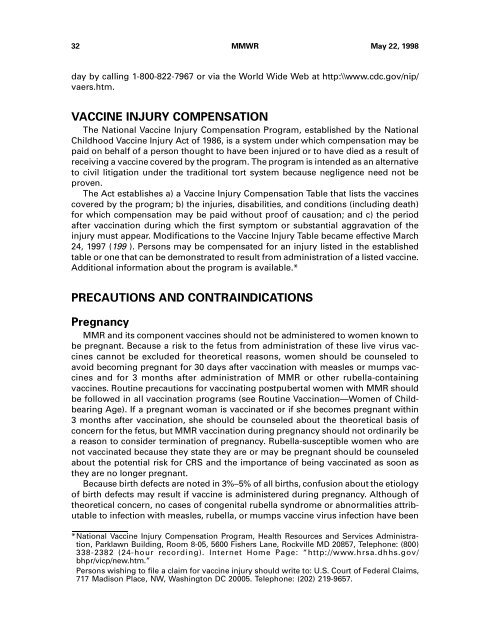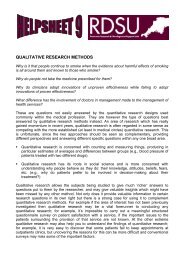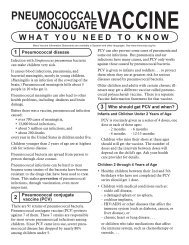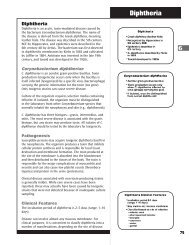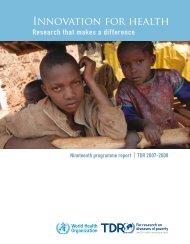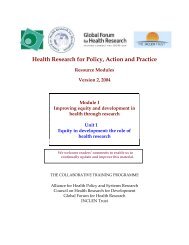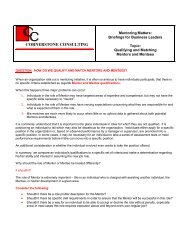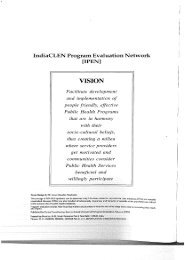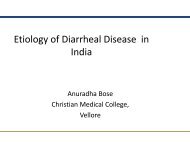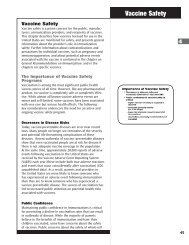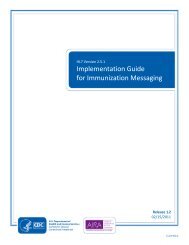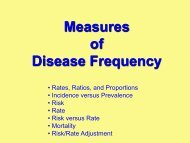Measles, Mumps, and Rubella - Centers for Disease Control and ...
Measles, Mumps, and Rubella - Centers for Disease Control and ...
Measles, Mumps, and Rubella - Centers for Disease Control and ...
Create successful ePaper yourself
Turn your PDF publications into a flip-book with our unique Google optimized e-Paper software.
32 MMWR May 22, 1998day by calling 1-800-822-7967 or via the World Wide Web at http:\\www.cdc.gov/nip/vaers.htm.VACCINE INJURY COMPENSATIONThe National Vaccine Injury Compensation Program, established by the NationalChildhood Vaccine Injury Act of 1986, is a system under which compensation may bepaid on behalf of a person thought to have been injured or to have died as a result ofreceiving a vaccine covered by the program. The program is intended as an alternativeto civil litigation under the traditional tort system because negligence need not beproven.The Act establishes a) a Vaccine Injury Compensation Table that lists the vaccinescovered by the program; b) the injuries, disabilities, <strong>and</strong> conditions (including death)<strong>for</strong> which compensation may be paid without proof of causation; <strong>and</strong> c) the periodafter vaccination during which the first symptom or substantial aggravation of theinjury must appear. Modifications to the Vaccine Injury Table became effective March24, 1997 (199 ). Persons may be compensated <strong>for</strong> an injury listed in the establishedtable or one that can be demonstrated to result from administration of a listed vaccine.Additional in<strong>for</strong>mation about the program is available.*PRECAUTIONS AND CONTRAINDICATIONSPregnancyMMR <strong>and</strong> its component vaccines should not be administered to women known tobe pregnant. Because a risk to the fetus from administration of these live virus vaccinescannot be excluded <strong>for</strong> theoretical reasons, women should be counseled toavoid becoming pregnant <strong>for</strong> 30 days after vaccination with measles or mumps vaccines<strong>and</strong> <strong>for</strong> 3 months after administration of MMR or other rubella-containingvaccines. Routine precautions <strong>for</strong> vaccinating postpubertal women with MMR shouldbe followed in all vaccination programs (see Routine Vaccination—Women of ChildbearingAge). If a pregnant woman is vaccinated or if she becomes pregnant within3 months after vaccination, she should be counseled about the theoretical basis ofconcern <strong>for</strong> the fetus, but MMR vaccination during pregnancy should not ordinarily bea reason to consider termination of pregnancy. <strong>Rubella</strong>-susceptible women who arenot vaccinated because they state they are or may be pregnant should be counseledabout the potential risk <strong>for</strong> CRS <strong>and</strong> the importance of being vaccinated as soon asthey are no longer pregnant.Because birth defects are noted in 3%–5% of all births, confusion about the etiologyof birth defects may result if vaccine is administered during pregnancy. Although oftheoretical concern, no cases of congenital rubella syndrome or abnormalities attributableto infection with measles, rubella, or mumps vaccine virus infection have been*National Vaccine Injury Compensation Program, Health Resources <strong>and</strong> Services Administration,Parklawn Building, Room 8-05, 5600 Fishers Lane, Rockville MD 20857, Telephone: (800)338-2382 (24-hour recording). Internet Home Page: “http://www.hrsa.dhhs.gov/bhpr/vicp/new.htm.”Persons wishing to file a claim <strong>for</strong> vaccine injury should write to: U.S. Court of Federal Claims,717 Madison Place, NW, Washington DC 20005. Telephone: (202) 219-9657.


